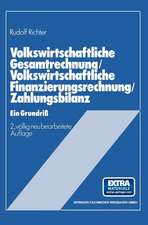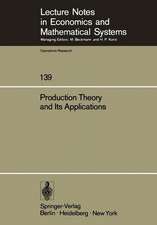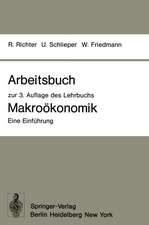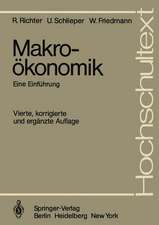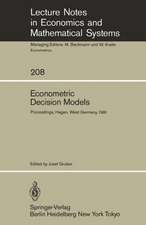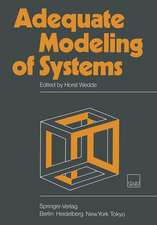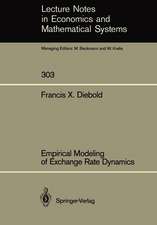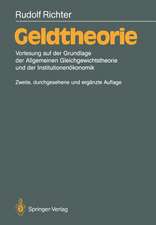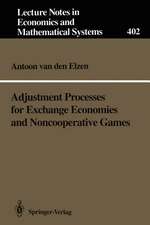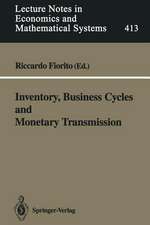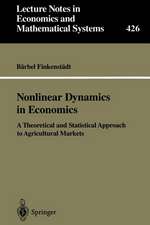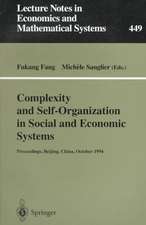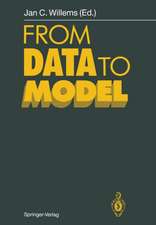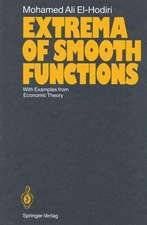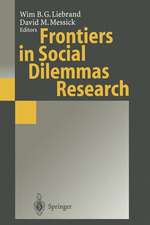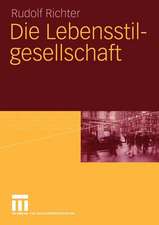Essays on New Institutional Economics
Autor Rudolf Richteren Limba Engleză Paperback – 17 oct 2016
| Toate formatele și edițiile | Preț | Express |
|---|---|---|
| Paperback (1) | 636.63 lei 6-8 săpt. | |
| Springer International Publishing – 17 oct 2016 | 636.63 lei 6-8 săpt. | |
| Hardback (1) | 642.83 lei 6-8 săpt. | |
| Springer International Publishing – 13 mai 2015 | 642.83 lei 6-8 săpt. |
Preț: 636.63 lei
Preț vechi: 748.97 lei
-15% Nou
Puncte Express: 955
Preț estimativ în valută:
121.82€ • 126.94$ • 100.87£
121.82€ • 126.94$ • 100.87£
Carte tipărită la comandă
Livrare economică 03-17 aprilie
Preluare comenzi: 021 569.72.76
Specificații
ISBN-13: 9783319386362
ISBN-10: 3319386360
Pagini: 219
Ilustrații: XIV, 205 p. 2 illus.
Dimensiuni: 155 x 235 x 12 mm
Greutate: 0.31 kg
Ediția:Softcover reprint of the original 1st ed. 2015
Editura: Springer International Publishing
Colecția Springer
Locul publicării:Cham, Switzerland
ISBN-10: 3319386360
Pagini: 219
Ilustrații: XIV, 205 p. 2 illus.
Dimensiuni: 155 x 235 x 12 mm
Greutate: 0.31 kg
Ediția:Softcover reprint of the original 1st ed. 2015
Editura: Springer International Publishing
Colecția Springer
Locul publicării:Cham, Switzerland
Cuprins
Preface.- The New Institutional Economics: Its Start, its Meaning, its Prospects.-Uncertainty in Economic Theory from the Perspective of New Institutional Economics.- New Economic Sociology and New Institutional Economics.- The Role of Law in the New Institutional Economics.- Entrepreneurs as Surrogate Forward Traders of Goods and Services, Seen from the Viewpoint of New Institutional Economics.- The Euro Crisis from the Perspective of the Preceding Debates on Fixed Versus Flexible Exchange Rates and the European Currency Union.- Why Price Stability? A Brief Answer from the Perspective of the New Institutional Economics.- Bringing Old and New Institutional Economics: Gustav Schmoller, the Leader of the Younger German Historical School, seen with Neoinstitutionalists' Eyes.- German "Ordnungstheorie" from the Perspective of the New Institutional Economics.- Methodology from the Viewpoint of an Economic Theorist - Fifty Years On.
Notă biografică
Rudolf Richter is emeritus Professor of economics and Director of the Workshop on The New Institutional Economics at the University of Saarland, Saarbrücken, Germany. He started his academic career in 1953 at the J. W. Goethe University, Frankfurt/ Main, Germany, interrupted by two separate years at American Universities, teaching and working largely on microeconomic issues. In 1961 he became professor of economics at the Christian Albrecht University, Kiel, Germany. In 1964 he received an offer from the University of Saarland, Saarbrücken where he worked until 1994. During this time he spent several years as visiting professor at the University of Michigan, at Texas A&M University, and as visiting fellow at the Hoover Institution, Stanford University. While in Saarbrücken he worked on and taught mainly macroeconomic issues with a special interest in money-macroeconomics. In 1978, he assumed the editorship of the Zeitschrift für die gesamte Staatswissenschaft, a position he held for 17 years until his retirement in 1994. He became interested in the work of Ronald Coase, Oliver Williamson, Douglass North and other representatives of what is known today as New Institutional Economics (NIE), a field he made public in Germany and beyond, by starting (jointly with Eirik Furubotn) an annual series of International Seminars on NIE for invited participants (in particular leading scholars of the field). He published their presented papers and comments in the Zeitschrift für die gesamte Staatswissenschaft, which under his editorship became the Journal of Institutional and Theoretical Economics (from 1986 on). He also organized seven Summer Schools on NIE and together with Eirik Furubotn published a comprehensive monograph on the subject (1st edition 1998, 2nd edition 2005).
Textul de pe ultima copertă
This collection of essays comprises some of Rudolf Richter’s important contributions to research on New Institutional Economics (NIE). It deals with the central idea, principles, and methodology of New Institutional Economics and explores its relation to sociology and law. Other chapters examine applications of NIE to various microeconomic and macroeconomic issues in the face of uncertainty, from entrepreneurship to the euro crisis.
Caracteristici
Presents an outstanding collection of essays on New Institutional Economics (NIE) Shows the merits of NIE in explaining how to efficiently adapt to unforeseen events Brings together for the first time articles by Rudolf Richter that illustrate the wide applicability of the NIE rationale Provides insights into the influence of NIE on general economic theory as well as related disciplines such as law and sociology Includes supplementary material: sn.pub/extras

